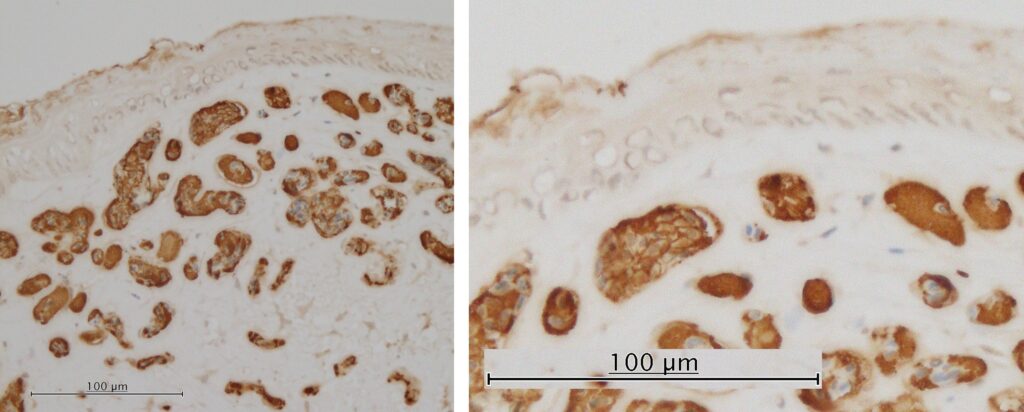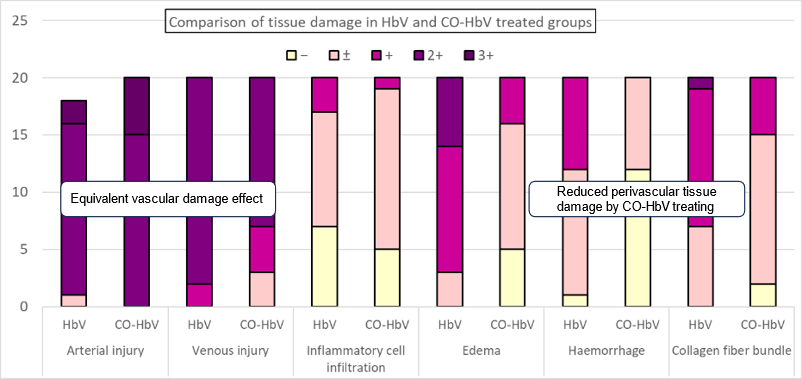Advantage and Core Benefit
- HbVs: our artificial red blood cells are 1/30th the size of RBCs and have a characteristic intravascular distribution, demonstrating the efficacy of laser therapy in treating vascular lesions of red moles, regardless of the thickness and depth of the blood vessels.
- Protects perivascular tissue from thermal damage due to the strong antioxidant and anti-inflammatory effects of carbon monoxide released by photolysis.
Background and Technology
Port-wine Stains are red plaques caused by dilation or abnormal formation of skin microvascular and occur in about 0.3% of newborns. Laser irradiation therapy is used and is based on the principle that laser light absorbed by hemoglobin in the blood vessels is converted to thermal energy, which causes necrosis of the vascular endothelium. However, in cases with deep, thin, or thick vessels, the conversion rate and heat transfer of photothermal energy is reduced, resulting in treatment resistance. Approximately 10-30% of cases are refractory. In addition, treatment can cause serious complications such as hyperpigmentation and scarring due to partial thermal damage to the surrounding tissue as well as the blood vessels.
Hemoglobin vesicles (HbV) are blood substitutes containing purified hemoglobin encapsulated in liposomes. The inventors applied HbV as a photosensitizer for laser therapy of Port-wine Stains and demonstrated its high efficacy in an animal model of Port-wine Stains. Simulation experiments have shown that HbV can enhance the efficacy of laser therapy. In fact, in animal experiments, HbV strongly disrupted small, large, and even deep blood vessels that cause treatment resistance. Furthermore, laser irradiation using carbon monoxide-bound hemoglobin vesicles (CO-HbV), an intermediate in the manufacturing process of HbV, successfully enhanced vascular damage as much as HbV, while reducing thermal damage to perivascular tissue. It is suggested that the strong reducing effect of free CO generated by photolysis is responsible for the antioxidant and anti-inflammatory effects by neutralizing reactive oxygen species, and the use of CO-HbV as a sensitizing agent is expected to make laser treatment of Port-wine Stains safer and more effective.
Data
- Histology after laser irradiation of chick meat ducts treated with HbV. Enhanced vascular damage and large thrombus formation were observed in small, large, and deep vessels. Arrows indicate HbV clots widely adherent in the upper part of the vessel.
- Comparison of perivascular tissue damage after laser irradiation with HbV and CO-HbV, showing less damage including edema, hemorrhage, and necrosis when CO-HbV was administered.
 |
 |
Patent & Publication
JPA 2020-206156, etc.
Researcher
Dr. Naoaki Rikihisa (Chiba University Hospital)
Current Stage
- The production methods of HbV and CO-HbV investigational agents have been established (Nara Med. Univ.), and HbV is being tested for human administration for transfusion use.
- Light and heat simulations in various types of blood vessels have confirmed the sensitizing effects of HbV. The safety of CO-HbV has been confirmed in the literature and in animal studies.
- Next: Pre-clinical safety study of CO-HbV
Expectations
Chiba University is looking for drug discovery partners who are willing to pursue safety studies and clinical development. We are particularly looking forward to collaborating with development companies in the field of dermatology and companies interested in developing artificial blood.
Project No. WL-04638


